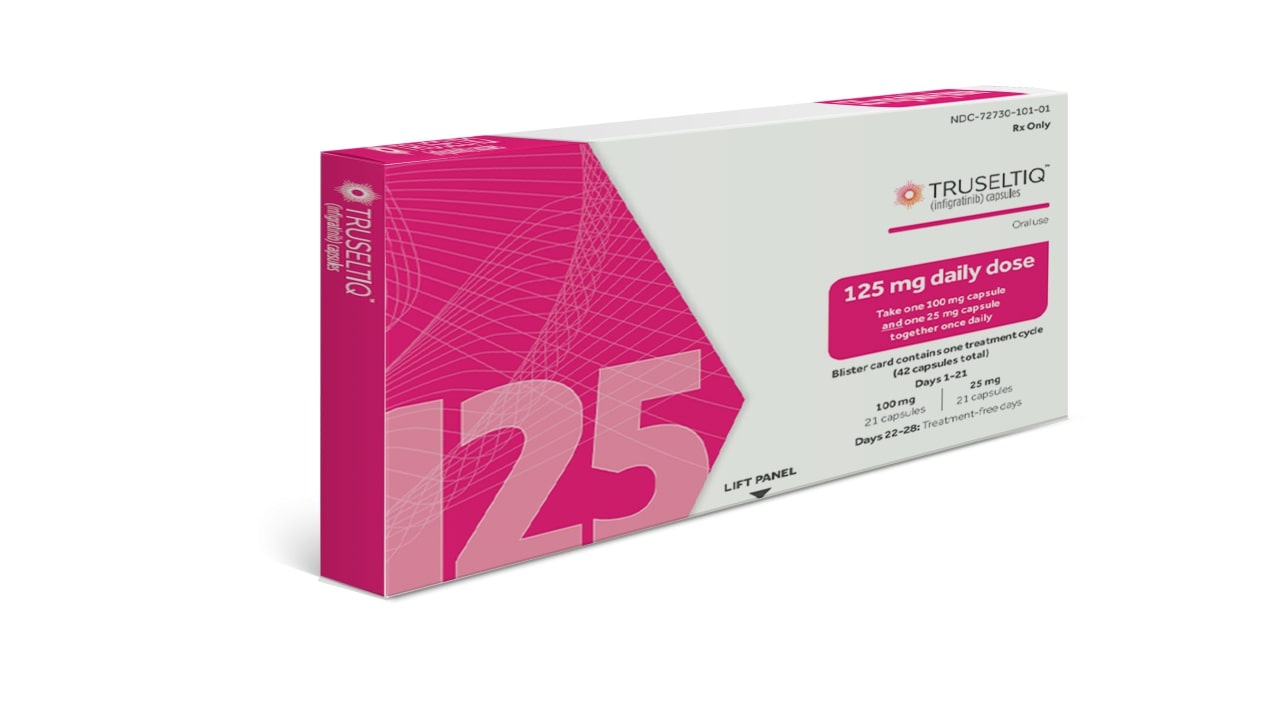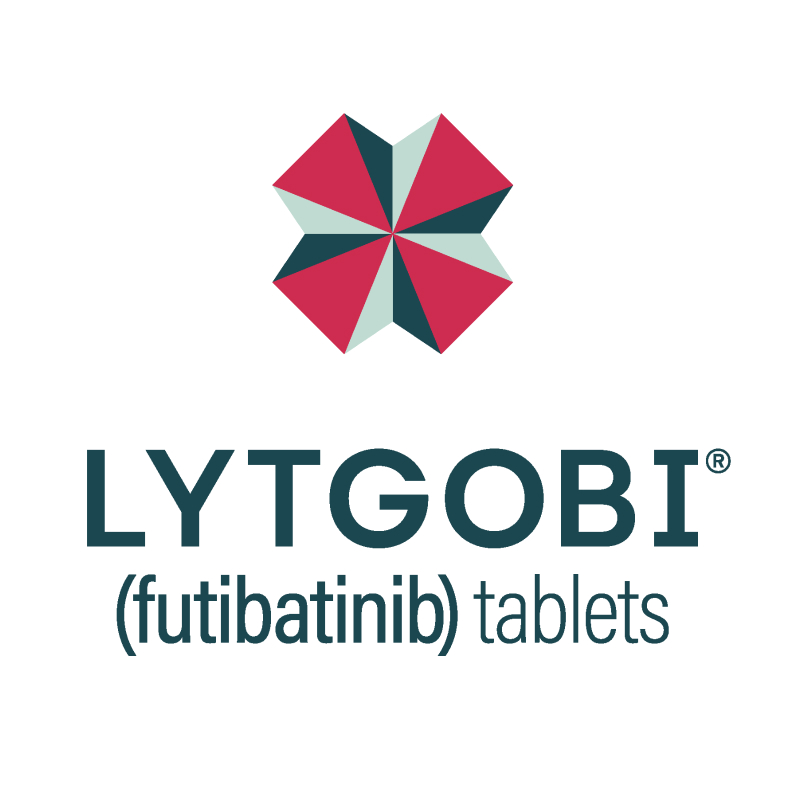Truseltiq (infigratinib) vs Lytgobi (futibatinib)
Truseltiq (infigratinib) vs Lytgobi (futibatinib)
Truseltiq (infigratinib) is an oral kinase inhibitor specifically targeting FGFR1-3 genetic aberrations, approved for the treatment of previously treated, unresectable locally advanced or metastatic cholangiocarcinoma with an FGFR2 fusion or other rearrangement. Lytgobi (futibatinib) is also an FGFR1-4 inhibitor, but it is distinguished by its covalent binding mechanism, which may offer a different pharmacokinetic profile, and it is approved for the treatment of adult patients with previously treated, unresectable, locally advanced or metastatic intrahepatic cholangiocarcinoma harboring FGFR2 gene fusions or other rearrangements. When deciding between Truseltiq and Lytgobi, it is essential to consider the specific FGFR alterations present, prior treatments, and the individual patient's medical history, as well as to consult with a healthcare provider to determine the most appropriate therapy based on the patient's unique circumstances.
Difference between Truseltiq and Lytgobi
| Metric | Truseltiq (infigratinib) | Lytgobi (futibatinib) |
|---|---|---|
| Generic name | Infigratinib | Futibatinib |
| Indications | Previously treated, unresectable locally advanced or metastatic cholangiocarcinoma with a FGFR2 fusion or other rearrangement | Treatment of adult patients with previously treated, unresectable, locally advanced or metastatic intrahepatic cholangiocarcinoma harboring FGFR2 gene rearrangements |
| Mechanism of action | FGFR1-3 tyrosine kinase inhibitor | FGFR1-4 kinase inhibitor |
| Brand names | Truseltiq | Lytgobi |
| Administrative route | Oral | Oral |
| Side effects | Hyperphosphatemia, stomatitis, fatigue, alopecia, palmar-plantar erythrodysesthesia, arthralgia/musculoskeletal pain, dysgeusia, constipation, dry mouth, dry skin, decreased appetite, nausea, vomiting, onycholysis, pruritus, dry eye, hair loss, abdominal pain, diarrhea, dry eye, and anemia | Hyperphosphatemia, alopecia, fatigue, dysgeusia, dry mouth, stomatitis, arthralgia, decreased appetite, nausea, diarrhea, dry skin, weight decreased, vomiting, constipation, abdominal pain, and musculoskeletal pain |
| Contraindications | None known | None known |
| Drug class | Antineoplastic agent, FGFR kinase inhibitor | Antineoplastic agent, FGFR kinase inhibitor |
| Manufacturer | QED Therapeutics, Inc. | Taiho Oncology, Inc. |
Efficacy
Truseltiq (infigratinib) Efficacy in Bile Duct Cancer
Truseltiq (infigratinib) is an oral kinase inhibitor specifically targeting the fibroblast growth factor receptor (FGFR). It has been granted accelerated approval by the U.S. Food and Drug Administration (FDA) for the treatment of previously treated, unresectable locally advanced or metastatic cholangiocarcinoma (bile duct cancer) with a fusion or other rearrangement of FGFR2. The efficacy of Truseltiq in this setting was evaluated in a clinical trial that enrolled patients with FGFR2 fusion or rearrangement-positive cholangiocarcinoma who had progressed on or after at least one prior line of therapy. The trial demonstrated a clinically meaningful objective response rate, with a subset of patients achieving a durable response, indicating that Truseltiq can provide a significant benefit for patients with this specific genetic alteration in bile duct cancer.
Lytgobi (futibatinib) Efficacy in Bile Duct Cancer
Lytgobi (futibatinib) is another FGFR inhibitor that has shown promise in the treatment of bile duct cancer. While it is not yet approved by the FDA specifically for this indication, clinical trials are underway to evaluate its efficacy and safety in patients with advanced cholangiocarcinoma harboring FGFR2 gene alterations. Preliminary data from these studies suggest that futibatinib has antitumor activity in patients with FGFR2 fusion-positive bile duct cancer. The results indicate that futibatinib can lead to partial responses and stable disease in a significant proportion of patients, with some experiencing a meaningful duration of response.
Both Truseltiq and Lytgobi represent a targeted therapeutic approach for bile duct cancer, which historically has had limited treatment options and a poor prognosis. The development of these FGFR inhibitors provides a new avenue for therapy that is tailored to the genetic profile of the tumor, which may improve outcomes for patients with this challenging disease. It is important to note that the efficacy of these drugs is contingent upon the presence of specific FGFR2 genetic alterations, and therefore, appropriate biomarker testing is essential to identify eligible patients for treatment with these agents.
As research continues and more data become available, the role of FGFR inhibitors like Truseltiq and Lytgobi in the treatment of bile duct cancer may become more clearly defined. Ongoing clinical trials and real-world studies will help to further elucidate their efficacy, safety, and potential place in the therapeutic landscape for cholangiocarcinoma. It is also anticipated that future studies will explore the potential for combination therapies involving FGFR inhibitors and other treatment modalities to enhance efficacy and overcome resistance mechanisms.
Regulatory Agency Approvals
Truseltiq
-
Food and Drug Administration (FDA), USA

Lytgobi
-
European Medical Agency (EMA), European Union

-
Food and Drug Administration (FDA), USA

Access Truseltiq or Lytgobi today
If Truseltiq or Lytgobi are not approved or available in your country (e.g. due to supply issues), you can access them via Everyone.org.
How it works

Make an enquiry
Choose the medicine you want to buy, answer a couple of questions, and upload your prescription to speed things up. We’ll get back to you within 24 hours.


Make an enquiry
Choose the medicine you want to buy, answer a couple of questions, and upload your prescription to speed things up. We’ll get back to you within 24 hours.


Breeze through the paperwork
We'll guide you through the required documents for importing unapproved medicine, ensuring you have all the necessary information.


Get a personalized quote
We’ll prepare a quote for you, including medicine costs and any shipping, administrative, or import fees that may apply.


Receive your medicine
Accept the quote and we’ll handle the rest - sourcing and safely delivering your medicine.

Some text on this page has been automatically generated. Speak to your physician before you start a new treatment or medication.
Let's talk
If you have any questions, call us or send us a message through WhatsApp or email:
Contact us




